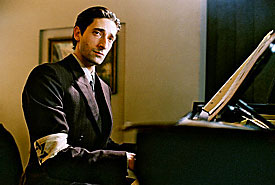 |
|
Photo courtesy of Focus
|
"The Pianist" stars Adrian Brody and is based on the memoirs of Wladyslaw Szpilman, a talented pianist and Polish Jew who survives the Holocaust of World World II. The film is now playing nationwide.
|
|
By Mark Betancourt
Arizona Daily Wildcat
Thursday January 30, 2003
It happens every Oscar night. It comes time for the Best Documentary award, and you can see the looks on the faces of the people nominated for non-Holocaust-related films. Total resignation.
Not that movies about the Holocaust don't sometimes deserve recognition. But seriously, we've got this idea that panning a film is panning what it's about, and nobody wants to sit through a depiction of what most people consider the worst thing in living memory, then turn around and say "Eh, it didn't really do it for me."
Still, "The Pianist," which is about the Holocaust, didn't really do it for me. The reasons are difficult to express. It seems prudent to look at the big picture and then focus in through social contexts and the way in which our collective cinematic experience has developed over time.
But first, a quick word about the film in particular.
"The Pianist" is the true story of a master pianist, a Polish Jew, who survives the Holocaust.
Now. Let's start way out in the world of language. We call the period around World War II during which Nazi Germany systematically eradicated millions of Jews, Gypsies, Poles and others "the Holocaust." This is kind of like we Americans referring to the United States as "the nation," as if there aren't others. The Holocaust is our nightmare, because of our deep involvement in its coinciding war, because of our large Jewish population, because of all the publicity it got; there are more reasons.
Let us acknowledge for a moment that millions of people have also been slaughtered in Rwanda and other areas much more recently, but since nobody really noticed, it's generally understood that that's not what we're referring to when we say "the Holocaust." The point is that we use a sort of cultural shorthand for atrocity, summarizing years of mass agony with a single word ÷ a word that wins Oscars.
It wins Oscars because we're especially sensitive to the horrors of the Holocaust that happened in Europe. As many times as we've heard it, from grade school Holocaust primers like "Number the Stars" and "The Diary of Anne Frank" to "Schindler's List," we still have trouble believing that the Nazis were really just shooting innocent people in the streets.
"The Pianist" uses that as its main, even sole, impetus. When a woman asks a Nazi soldier where she and her family are being sent in the trains, he shoots her point-blank in the forehead. People in the theater gasp audibly.
This has some legitimacy. After all, you couldn't leave things like that out of this story. It really happened, and the film must establish that. The problem is this film is chock full of those kinds of instances, to the point where there is literally some appalling act of inhuman violence in every scene. It becomes laughable, if I may use the word academically.
Truthfully, humans sitting in a theater after a warm meal with a loved one sitting nearby are simply not capable of empathizing with a fictionalized character who apparently can't turn around without seeing one of his family members brutally murdered. At some point, it must be recognized that this is a movie, something designed to help people understand things at best, but a lot of them are there because the reviews are good or there's free air conditioning.
So why is "The Pianist" so hard to swallow, when maybe something like "Life is Beautiful" is less so? The difference is that "The Pianist" is a straight, chronological narrative of what one person did to survive atrocity. According to the film, he did things like hide and eat raw grain. "Life is Beautiful" is also about how one person survived atrocity, except according to that film, he did it by making his world seem sane, even beautiful. The difference is crucial.
At the end of "Life is Beautiful," the audience feels like it knows something about the Holocaust experience. They don't really understand; how could they? But they can truthfully say to themselves: "Yes, I can empathize with the way that person dealt with that situation."
After "The Pianist," you can hypothesize about whether you would eat grain or not, but it doesn't matter. You can imagine that you would have been scared, that you would have missed your family. But you don't know how the pianist feels while he's searching for food, what he's thinking about during those long nights crammed in a hiding place listening to the war rage on around him. You watch him from a cold distance. You have nothing to connect you to him or to the experience.
"The Pianist" just displays a set of facts in the shorthand of cinema, the trickiest cop-out of all: realism. You see the horror of the Holocaust with your own eyes, you hear it in Dolby Surround, but you have no way of making sense of it on your own ÷ and chances are, when you leave the theater, you'd rather forget it.

